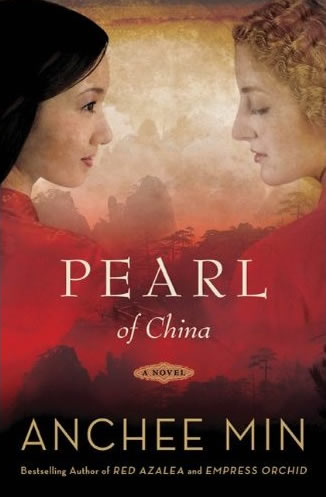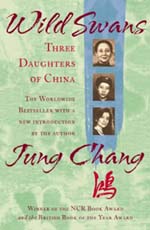Hello Bookworms! I’ve mentioned that I’m highly susceptible to marketing tactics, have I not? I purchased the latest entry in my Kindle because Amazon was having a sale. A girl’s got to budget, you know?
Pearl of China by Anchee Min is a novel based in part on the life of Pearl S. Buck. Pearl S. Buck, in case you were unaware, is a Nobel Prize winning author. A Nobel Prize winning author yours truly has never read, shamefully, although now I fully intend to add some of her work to my never ending reading list.

If this book hadn’t taken some historical liberties, it would be a dry-as-toast biography that nobody would want to read. So, Anchee Min, I’ll forgive any historical inconsistencies that might exist here because it was so enthralling. Pearl of China is written from the point of view of Pearl’s childhood best friend, Willow. Willow is largely fictional, but as a fictional character the author has the freedom to give her the sort of life story that is most compatible with Pearl’s legacy, so it all works out in a nice little package.
Willow is born into abject poverty. Her father was born into a wealthy family that falls to ruin and has a difficult time adjusting to his new circumstances. He goes so far as to rent out his wife as a prostitute (yeah, Chinese women really get the raw end of the deal A LOT.) Unfortunately, when Willow’s mother becomes pregnant as a result of this encounter, she is killed by an attempted herbal abortion. So. Willow is poor. She is motherless. And she’s a thief so she doesn’t starve to death. It pretty much sucks to be Willow.
Pearl lives in Willow’s village. Pearl is the daughter of American missionaries who have come to China to convert the heathens. In a way, this book reminded me of Barbara Kingsolver’s The Poisonwood Bible as that was about a missionary family living in Africa (you should read The Poisonwood Bible if you haven’t- it’s very good.) The biggest difference between the two though, is that the daughters in The Poisonwood Bible are brought to Africa as adolescents (except for little Ruth.) They are old enough to experience the culture shock that comes with leaving 1960s Georgia and trying to make a life in the decidedly less industrialized African Congo. Pearl, though, is brought to China as an infant. She learns the language the way a Chinese child would and identifies more closely with the culture she is raised in than the culture she was born into.

Pearl is an outcast because she’s not Chinese and her father is more than a little overzealous about converting the townspeople. Willow is an outcast because she and her father are thieves. Luckily for both girls, they find each other and their families intertwine to their mutual benefit. They forge a friendship that will last them a lifetime.
Unfortunately for our heroines, China in the 1930s was NOT where you wanted to be if you were foreign. First a bloody war with Japan, and then the Communist uprising meant that a blond haired-blue eyed woman was a walking target. Eventually, Pearl and her family flee to the US, but her heart remains in China.
Willow, upon Pearl’s departure, marries a man who turns out to be one of Mao Zedong’s closest advisors. I don’t like to take sides in political battles. In fact, I hate it. However, it’s difficult not to get a little bit political when discussing early Communist China. In theory, Communism sounds great. Everyone is equal, everyone has enough food, everyone is taken care of. Unfortunately, that is NEVER the way it works in practice. If you don’t believe me check out what Stalin did in Russia. Mao totally wanted to be Stalin, so killing off dissidents and imprisoning people who happened to have ties with “outsiders” was par for the course. It really didn’t end up being “Communism” at all because there was totally an elite class favored by the dictatorship, and millions of people starved anyway. Sigh.
If you want to learn more about China and it’s less savory chapters in history, read Wild Swans: Three Daughters of China by Jung Chang. You’ll get first person accounts of this time period, as well as two generations previous. It’s excellent. You’ll learn things.

Anyway, poor Willow gets the short end of the stick with the Communists. Despite being married to a big wig, her friendship with Pearl (who started publishing novels critical of the regime) lands her in prison on several occasions. I don’t think I’ve ever read a novel on China that wasn’t absolutely devastating in one way or another, but beneath that devastation there’s always a stoic beauty about the place.
So my Bookworms, as this was a book centering on a lifelong friendship, let’s talk about it! Do you have any friends you’ve kept since childhood?



Quirky Chrissy
I feel as if I’ve known you since childhood. Does that count?
That being said, you’ve been nominated for a bloggy blog award! By me! (It may or may not be a “chain-blog,” but I don’t care! You get it.) Visit my post today to accept your award 🙂
http://quirkychrissy.com/2012/09/12/major-award/
Pants Pie
I was assigned to read Wild Swans in college and LOVED it. I think I’ll give this one a try, even if it’s not as historically accurate.
wordsforworms
I read Wild Swans for a class too! So good! I think you’ll like this one, let me know what you think!
Quirky Chrissy
Hey Word Worm… Was I supposed to read Wild Swans for a class?
wordsforworms
No, Bean. It was either a womens studies or history class. All the stuff you didn’t read was for our mutual English classes.